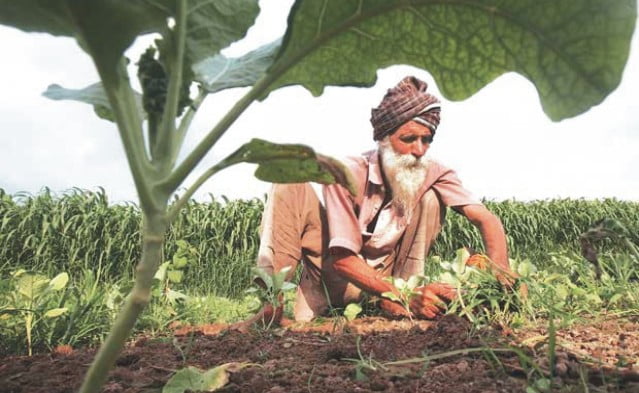

THE FARM BILLS will lead to a situation of under cultivation and underproduction of food grains and lack of MSP will hurt the farmers and will help the corporate sector, because they will become agents for the govt to import food grains and other agricultural commodities.
Eventually, landbanks sold at throwaway prices will be created to aggregate for corporate farms and other uses even as agricultural labour is pushed into cities to be used as a cheap labour force for large industrial complexes.
Let us look at another government scheme to understand the way these things work.
 In 2014, after NDA’s overwhelming victory, The PM mocked and berated MGNREGA in his inaugural address to the Parliament and the nation. He called it a blunder, yet promised to leave it in the law books to remind the country of the monumental stupidity of the UPA.
In 2014, after NDA’s overwhelming victory, The PM mocked and berated MGNREGA in his inaugural address to the Parliament and the nation. He called it a blunder, yet promised to leave it in the law books to remind the country of the monumental stupidity of the UPA.
In time the PM did realize that it was the most efficient system and process available to disseminate benefits to the rural areas and made a big show of increasing the budgetary outlays to the scheme. However, the deceit was evident.
Also Read: Farmers’ Movement: A Proud Legacy But Now Be Careful
The increased allocation was balanced out by not releasing the allocated funds and effectively drying out the scheme. This subterfuge was evident during the migrant crisis the country witnessed during the unplanned lockdown when MGNREGA was heralded as the vehicle of recovery but was never fuelled up.
 MGNREGA mandates weekly or fortnightly payments and the wait for wages to those rural households fortunate enough to get a job card and guaranteed employment has now gone up to almost three-plus months. The vast rural labour force has been left without any safety net to mitigate the economic distress they find themselves in.
MGNREGA mandates weekly or fortnightly payments and the wait for wages to those rural households fortunate enough to get a job card and guaranteed employment has now gone up to almost three-plus months. The vast rural labour force has been left without any safety net to mitigate the economic distress they find themselves in.
This example has been provided to indicate how a policy need not be deregulated to stop it from helping people; it is possible to drive it to the ground by withholding resources required for it to be implemented effectively.
Also Read: Farm Laws and Farmers’ Concerns: What is the way out?
The issue of Minimum Support Price (MSP) and the three farm bills surreptitiously introduced first as ordinances and then hurried through the parliamentary process point to similar Machiavellian tactics of the government.

Since 2016, the PM has appropriated the space of the government on himself. There is a complete absence of all other elected representatives of the people. They surface occasionally, add their voice to the pro farm lobby or display a government positive stance, and then disappear till the next time.
In introducing the three farm bills perhaps the PM was expecting passive submission and a capitulation of token resistance.
Certainly, the large-scale farmers’ agitation was not anticipated, given the docile acceptance by the country of any and every policy, starting from Demonetization (2016), Implementation of flawed (GST) (2017), cushioning of Jio’s entry into telecom space (2016), acceptance of a controversial Rafael Defense deal (2017) that the PM has pushed forward so far.

Demonetization and the failure of implementation of the GST have largely bankrupted the government. The deficits of the government have been financed largely by sales of the private sector undertakings.
Quite frankly, the government is broke and it has been abundantly clear in its inability to provide any support to the economy devastated by the Covid related lockdown.
The government doesn’t have the financial capacity to support the MSP and pay for the grains that it picks up from the market.
Also Read: Why are farmers protesting when govt says these laws are good for them?
It can also be assumed that any confrontation resulting from the implementation of the three farm bills was thought ‘handle-able’ by the government by following the tried formula resting on ‘hyper-nationalism, minority identity”, hinged on the support of his hard-wired middle- class urban followers, euphemistically referred to as Bhakts (devotees).

Now, in the face of rising anger and protests, the govt may agree to the inclusion of a codified MSP in the farm bills, as a face-saving device. However, there is more here than the over-simplification of the argument getting centered on the MSP.
The government of India through the Food Corporation of India lifts huge quantities of food grains for two purposes, to stock the retail PDS and for stockpiling grains in case the country faces monsoon failure or ravaging floods, thus a crop failure.
A considerable amount of food grain stock is also picked up by big corporates in the retail segment of selling ‘atta’ (wheat flour), and a quick look at the books of ITC and other major players in this space will tell you that it is not a profit-making segment for almost all of them.
The payment of the MSP to procure wheat from the mandis makes this business unviable; the cost of procurement is far too high and the availability of generic ‘atta’ in the informal markets (chakkis and other small flour mills) forces the corporates to sell their branded products at lower prices, effectively making their profit margins low.
This was also seen in the failure of Shaktibhog atta, an early pioneer in the branded atta space, currently facing court proceedings with huge uncleared NPA against its name.
 The entire farm sector will collapse without the MSP; without the guaranteed price floors, the prices will go low and lower. The additional scrounge of the fear created by lifting food grains stock limits and introduction of agricultural contract has created a fear psychosis in the minds of the farmers.
The entire farm sector will collapse without the MSP; without the guaranteed price floors, the prices will go low and lower. The additional scrounge of the fear created by lifting food grains stock limits and introduction of agricultural contract has created a fear psychosis in the minds of the farmers.
The fear is justified because it allows for accumulating stocks over a period of one or two harvesting seasons and creating enough stocks to force the farmers to sell at lower prices in the subsequent ones, the option present with the few corporate buyers being to not buy at all.
Further, this will push the farmers towards court systems; places, circumstances, and systems that they are not familiar with and fearful of.
Also Read: A Punjab in negotiation: what did we get?
Thus, the two supplementary bills (essential commodities stock limits, contract farming) are secondary but equally important actors in this drama. The strategy seems simple, introduce three bills (or even more), create a genuine fear of withdrawal of support price, hoarding, and price gouging. Create clutter and distractions. Create a situation of chaos.
 Finally agree to put the MSP back in the bill. However, abstain from the markets or lift far lesser quantities of food grains, citing lack of funds, or even fudge data, as has been done abundantly in the past. And open the arena for the private sector to enter the market.
Finally agree to put the MSP back in the bill. However, abstain from the markets or lift far lesser quantities of food grains, citing lack of funds, or even fudge data, as has been done abundantly in the past. And open the arena for the private sector to enter the market.
MSP has been brandished as an evil price, a price floor that sets prices too low. That lets the prices of farm produce not achieve the highs that its dismantling will allow. In reality, without a complete and total MSP support, which anyway is not implemented fully even now, and the biggest buyer (govt) pulling away midway, the space is available for the corporates to employ predatory tactics of buying at lower prices outside of the legal mandis.
Essential commodities bill will provide the leeway of stocking goods bought low, to be sold later. And also increase the bargaining powers of the big buyers.
 Over the years, with the much-touted crop insurance failing more often than the crops and formal structures of farm credit drying up, agriculture has fallen on hard times indeed.
Over the years, with the much-touted crop insurance failing more often than the crops and formal structures of farm credit drying up, agriculture has fallen on hard times indeed.
With the middle man (Arhtiyas) being edged out and unable to find a place in the new farm policies implementation, the farmers will not have access to local loanable funds.
Also Read: THE NAIL-FLESH THEORY OF FARM AGITATION
Banks unwilling to step in as always will rely on banking policies that shortchange agricultural credit; and will not provide the farmers any recourse except to become contract farmers.
 Additionally, the Public Distribution System (PDS) which is the backbone of our country’s food policy and which is stocked from the foodgrains collected in the mandis will collapse.
Additionally, the Public Distribution System (PDS) which is the backbone of our country’s food policy and which is stocked from the foodgrains collected in the mandis will collapse.
Will the government procure from the market and then stock the retail ration shops, or will it discontinue the PDS, or will it rely on the Direct Benefit Transfer model?

The government has not weighed in on the consequences of this obvious cost of the new farm bills.
The current three farming bills have to be repealed. A new set of legislations have to be discussed, debated, and re-drafted. Keeping the larger interest of the agricultural sector, the farmers, and the country in mind.
We owe it to our farmers. ![]()
Also Read: #DilliChalo march has shattered the miasma of Hindutva’s power and arrogance
________________________________
Watch video:

Disclaimer : PunjabTodayTV.com and other platforms of the Punjab Today group strive to include views and opinions from across the entire spectrum, but by no means do we agree with everything we publish. Our efforts and editorial choices consistently underscore our authors’ right to the freedom of speech. However, it should be clear to all readers that individual authors are responsible for the information, ideas or opinions in their articles, and very often, these do not reflect the views of PunjabTodayTV.com or other platforms of the group. Punjab Today does not assume any responsibility or liability for the views of authors whose work appears here.
Punjab Today believes in serious, engaging, narrative journalism at a time when mainstream media houses seem to have given up on long-form writing and news television has blurred or altogether erased the lines between news and slapstick entertainment. We at Punjab Today believe that readers such as yourself appreciate cerebral journalism, and would like you to hold us against the best international industry standards. Brickbats are welcome even more than bouquets, though an occasional pat on the back is always encouraging. Good journalism can be a lifeline in these uncertain times worldwide. You can support us in myriad ways. To begin with, by spreading word about us and forwarding this reportage. Stay engaged.
— Team PT


Copyright © Punjab Today TV : All right Reserve 2016 - 2024 |